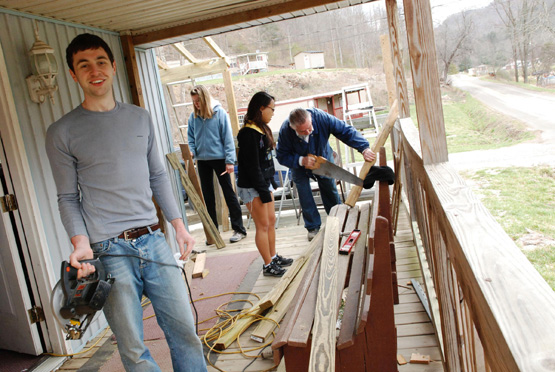Alternative Spring Break Is Taking Off
Service program adds flying trips, online registration

For the first time in its 23-year history, Boston University’s Alternative Spring Break (ASB) program is trading rubber wheels for airplane wings. This spring, volunteers will fly to 4 of the organization’s 35 service trip destinations.
“We wanted to expand to the West Coast and Puerto Rico,” says program manager Ariana Sherman (CAS’10), “and the only way to do that was by flying.”
In Seattle, students will work with Habitat for Humanity, one of the world’s largest nonprofit housing organizations, and in San Juan, P.R., they will volunteer at the nonprofit Iniciativa Comunitaria and contribute in areas of homelessness, HIV/AIDS awareness, and youth sexual education.
“Our main concern over Puerto Rico was safety,” says Zhandra Ferreira-Cesar (CAS’10), the ASB other program manager. “We spent a lot of time researching organizations in that area, and Iniciativa Comunitaria was very responsive to us. We also liked that so many of its sponsors are major U.S. health-care corporations.”
Ferreira-Cesar says that while both Puerto Rico trip coordinators, as well as the chaperone, are fluent in Spanish, fluency is not required for volunteers, adding that a general knowledge of the language is encouraged.
Organized by BU’s Community Service Center, ASB attracts hundreds of student volunteers and staff chaperones, who spend their spring break week in March working in disaster zones and troubled communities across the country. Destinations range from the country’s largest cities to the most remote of Appalachian villages, and the lineup includes a little bit of everything, from working with GLBT teens in Detroit and maintaining trails on Georgia’s Cumberland Island to caring for homeless animals in New Orleans and tutoring abused and neglected children in Natchez, Miss. Last spring, 416 volunteers traveled to 21 states and clocked in nearly 16,640 hours of service.
The two program managers spent the better part of the summer poring over trip evaluations from previous years to determine the destinations of the two other flying trips. Because of an “overwhelming response” to trips involving children, they added the San Francisco–based Girls, Inc., where volunteers will help with activities designed to inspire and empower girls, and the Peaceable Kingdom Retreat for Children, in Killeen, Tex., where they’ll work with chronically ill children at an outdoor education camp.
An ASB destination for many years, the Killeen trip was eliminated in 2009 because the 30-hour drive cut into time at the destination. Both Sherman and Ferreira-Cesar took that trip their freshman year and say they were pleased to be able to bring it back. “Killeen was such an incredible experience,” Sherman says. “It was our introduction to ASB, and we were heartbroken when it was canceled.”
Another major change made this year by Sherman and Ferreira-Cesar is moving registration online. That means that ASB volunteers will no longer have to camp out overnight at the George Sherman Union to guarantee a spot; they need only log on to the ASB Web site on Sunday, January 31, at 8 a.m. The process works similarly to reserving tickets on Ticketmaster; students have five minutes to enter their contact information and rank their trip preferences, which are awarded on a first-come, first-served basis.
“Diehard ASB fans may be initially disappointed that we moved registration online,” Ferreira-Cesar says. “But we received a lot of critical feedback over the registration process, and quite honestly, having students wait in line for 18 hours is a liability issue.”
Online registration also allows volunteers to pay by credit and debit card. Van trips cost $325, and flying trips $675. Students who can’t afford the registration fee may be eligible for full or partial scholarships.
Another change: because ASB will be using 12-passenger vans this year (deemed safer than the 15-passenger vans used in the past) each trip will consist of 10 volunteers, down from the 12 of previous years.
Registration for Alternative Spring Break will take place on Sunday, January 31, at 8 a.m. For updates, visit the ASB blog or call the Community Service Center at 617-353-4710.
Vicky Waltz can be reached at vwaltz@bu.edu.
Comments & Discussion
Boston University moderates comments to facilitate an informed, substantive, civil conversation. Abusive, profane, self-promotional, misleading, incoherent or off-topic comments will be rejected. Moderators are staffed during regular business hours (EST) and can only accept comments written in English. Statistics or facts must include a citation or a link to the citation.